Psychology of Behaviour Report: Perspectives, Influence, and Impact
VerifiedAdded on 2021/01/02
|11
|3784
|407
Report
AI Summary
This report provides an overview of the psychology of behaviour, exploring various psychological perspectives such as biological, psychodynamic, behaviourist, humanism, and cognitive perspectives, explaining how each contributes to understanding human behaviour. It examines the similarities and differences between these perspectives. The report also delves into the effects of social influences, including group influence, conformity, and obedience, on individual behaviour. Furthermore, it analyzes the consequences of prejudice and discrimination within the public service, highlighting the relevance of psychological perspectives and social influence in this context. The report concludes by summarizing the key findings and emphasizing the importance of understanding these psychological concepts for effective functioning in various social and professional settings.
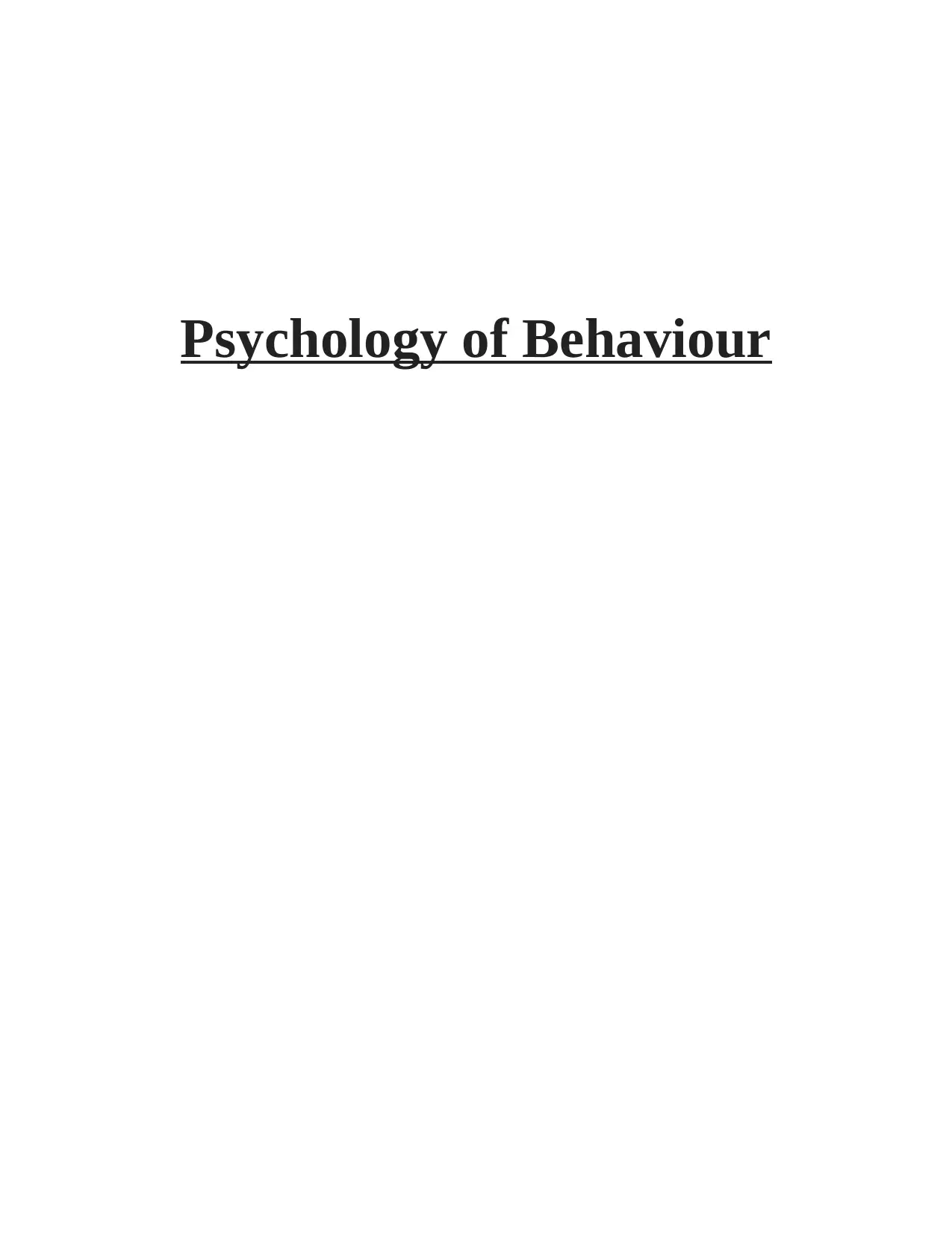
Psychology of Behaviour
Paraphrase This Document
Need a fresh take? Get an instant paraphrase of this document with our AI Paraphraser
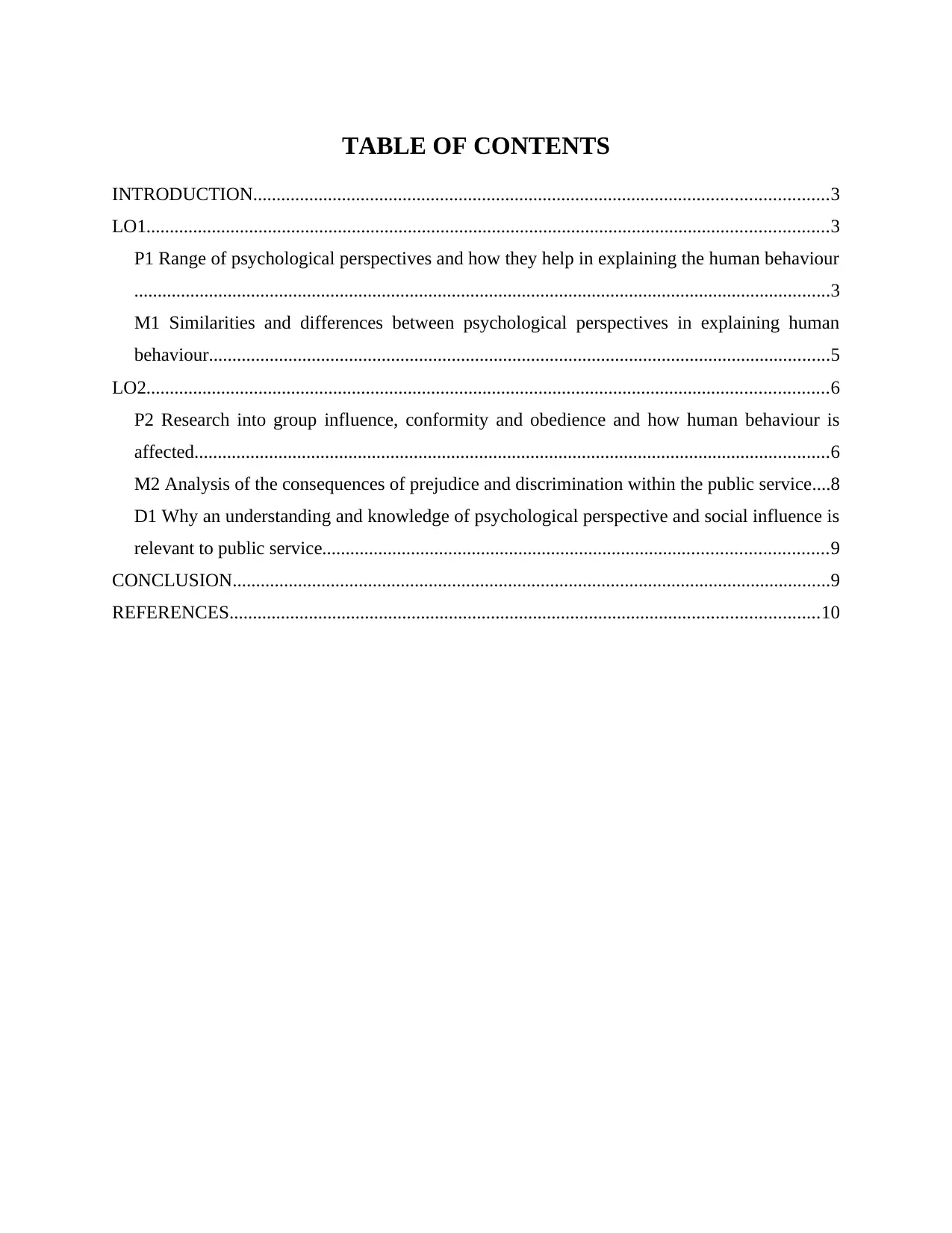
TABLE OF CONTENTS
INTRODUCTION...........................................................................................................................3
LO1..................................................................................................................................................3
P1 Range of psychological perspectives and how they help in explaining the human behaviour
.....................................................................................................................................................3
M1 Similarities and differences between psychological perspectives in explaining human
behaviour.....................................................................................................................................5
LO2..................................................................................................................................................6
P2 Research into group influence, conformity and obedience and how human behaviour is
affected........................................................................................................................................6
M2 Analysis of the consequences of prejudice and discrimination within the public service....8
D1 Why an understanding and knowledge of psychological perspective and social influence is
relevant to public service............................................................................................................9
CONCLUSION................................................................................................................................9
REFERENCES..............................................................................................................................10
INTRODUCTION...........................................................................................................................3
LO1..................................................................................................................................................3
P1 Range of psychological perspectives and how they help in explaining the human behaviour
.....................................................................................................................................................3
M1 Similarities and differences between psychological perspectives in explaining human
behaviour.....................................................................................................................................5
LO2..................................................................................................................................................6
P2 Research into group influence, conformity and obedience and how human behaviour is
affected........................................................................................................................................6
M2 Analysis of the consequences of prejudice and discrimination within the public service....8
D1 Why an understanding and knowledge of psychological perspective and social influence is
relevant to public service............................................................................................................9
CONCLUSION................................................................................................................................9
REFERENCES..............................................................................................................................10
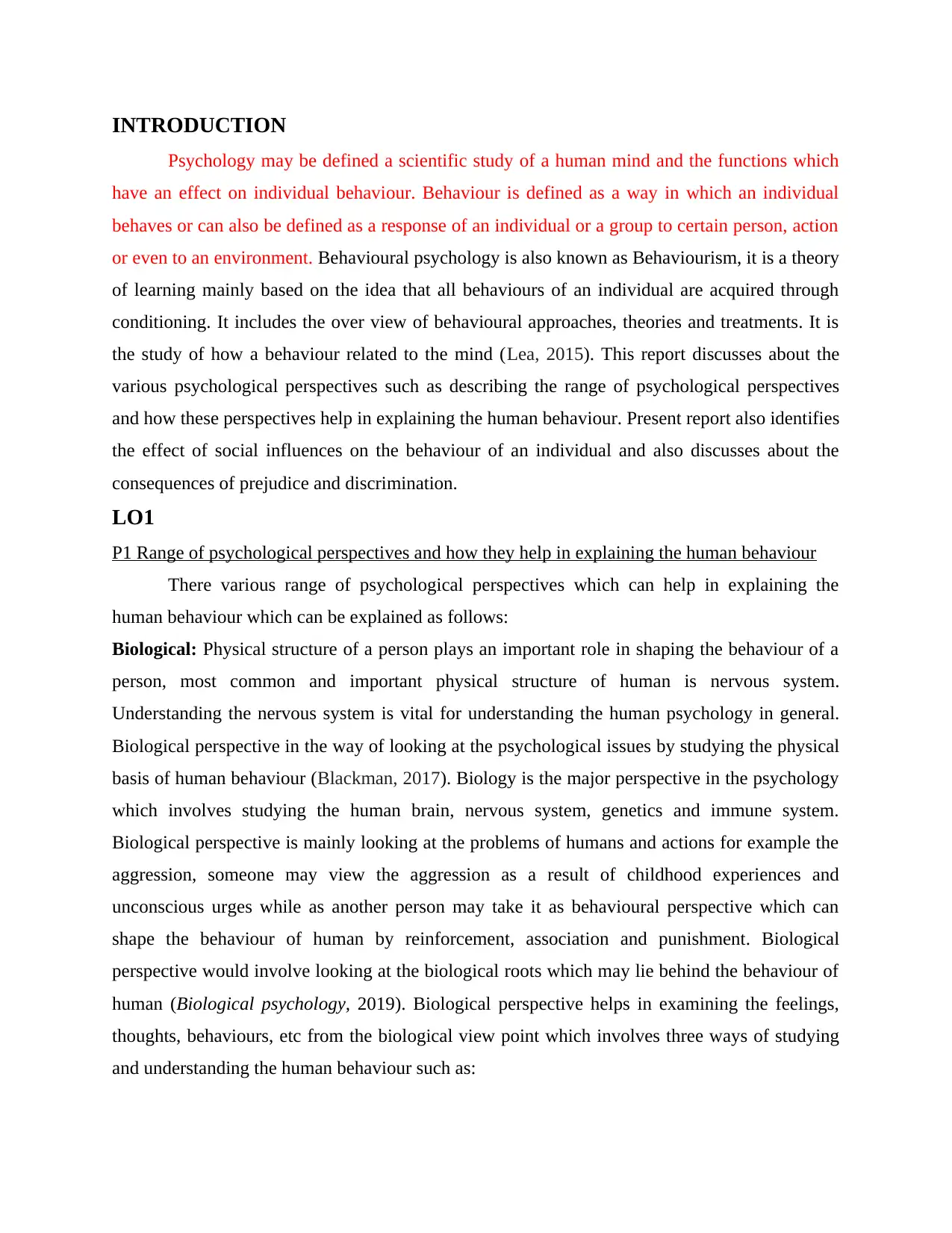
INTRODUCTION
Psychology may be defined a scientific study of a human mind and the functions which
have an effect on individual behaviour. Behaviour is defined as a way in which an individual
behaves or can also be defined as a response of an individual or a group to certain person, action
or even to an environment. Behavioural psychology is also known as Behaviourism, it is a theory
of learning mainly based on the idea that all behaviours of an individual are acquired through
conditioning. It includes the over view of behavioural approaches, theories and treatments. It is
the study of how a behaviour related to the mind (Lea, 2015). This report discusses about the
various psychological perspectives such as describing the range of psychological perspectives
and how these perspectives help in explaining the human behaviour. Present report also identifies
the effect of social influences on the behaviour of an individual and also discusses about the
consequences of prejudice and discrimination.
LO1
P1 Range of psychological perspectives and how they help in explaining the human behaviour
There various range of psychological perspectives which can help in explaining the
human behaviour which can be explained as follows:
Biological: Physical structure of a person plays an important role in shaping the behaviour of a
person, most common and important physical structure of human is nervous system.
Understanding the nervous system is vital for understanding the human psychology in general.
Biological perspective in the way of looking at the psychological issues by studying the physical
basis of human behaviour (Blackman, 2017). Biology is the major perspective in the psychology
which involves studying the human brain, nervous system, genetics and immune system.
Biological perspective is mainly looking at the problems of humans and actions for example the
aggression, someone may view the aggression as a result of childhood experiences and
unconscious urges while as another person may take it as behavioural perspective which can
shape the behaviour of human by reinforcement, association and punishment. Biological
perspective would involve looking at the biological roots which may lie behind the behaviour of
human (Biological psychology, 2019). Biological perspective helps in examining the feelings,
thoughts, behaviours, etc from the biological view point which involves three ways of studying
and understanding the human behaviour such as:
Psychology may be defined a scientific study of a human mind and the functions which
have an effect on individual behaviour. Behaviour is defined as a way in which an individual
behaves or can also be defined as a response of an individual or a group to certain person, action
or even to an environment. Behavioural psychology is also known as Behaviourism, it is a theory
of learning mainly based on the idea that all behaviours of an individual are acquired through
conditioning. It includes the over view of behavioural approaches, theories and treatments. It is
the study of how a behaviour related to the mind (Lea, 2015). This report discusses about the
various psychological perspectives such as describing the range of psychological perspectives
and how these perspectives help in explaining the human behaviour. Present report also identifies
the effect of social influences on the behaviour of an individual and also discusses about the
consequences of prejudice and discrimination.
LO1
P1 Range of psychological perspectives and how they help in explaining the human behaviour
There various range of psychological perspectives which can help in explaining the
human behaviour which can be explained as follows:
Biological: Physical structure of a person plays an important role in shaping the behaviour of a
person, most common and important physical structure of human is nervous system.
Understanding the nervous system is vital for understanding the human psychology in general.
Biological perspective in the way of looking at the psychological issues by studying the physical
basis of human behaviour (Blackman, 2017). Biology is the major perspective in the psychology
which involves studying the human brain, nervous system, genetics and immune system.
Biological perspective is mainly looking at the problems of humans and actions for example the
aggression, someone may view the aggression as a result of childhood experiences and
unconscious urges while as another person may take it as behavioural perspective which can
shape the behaviour of human by reinforcement, association and punishment. Biological
perspective would involve looking at the biological roots which may lie behind the behaviour of
human (Biological psychology, 2019). Biological perspective helps in examining the feelings,
thoughts, behaviours, etc from the biological view point which involves three ways of studying
and understanding the human behaviour such as:
⊘ This is a preview!⊘
Do you want full access?
Subscribe today to unlock all pages.

Trusted by 1+ million students worldwide
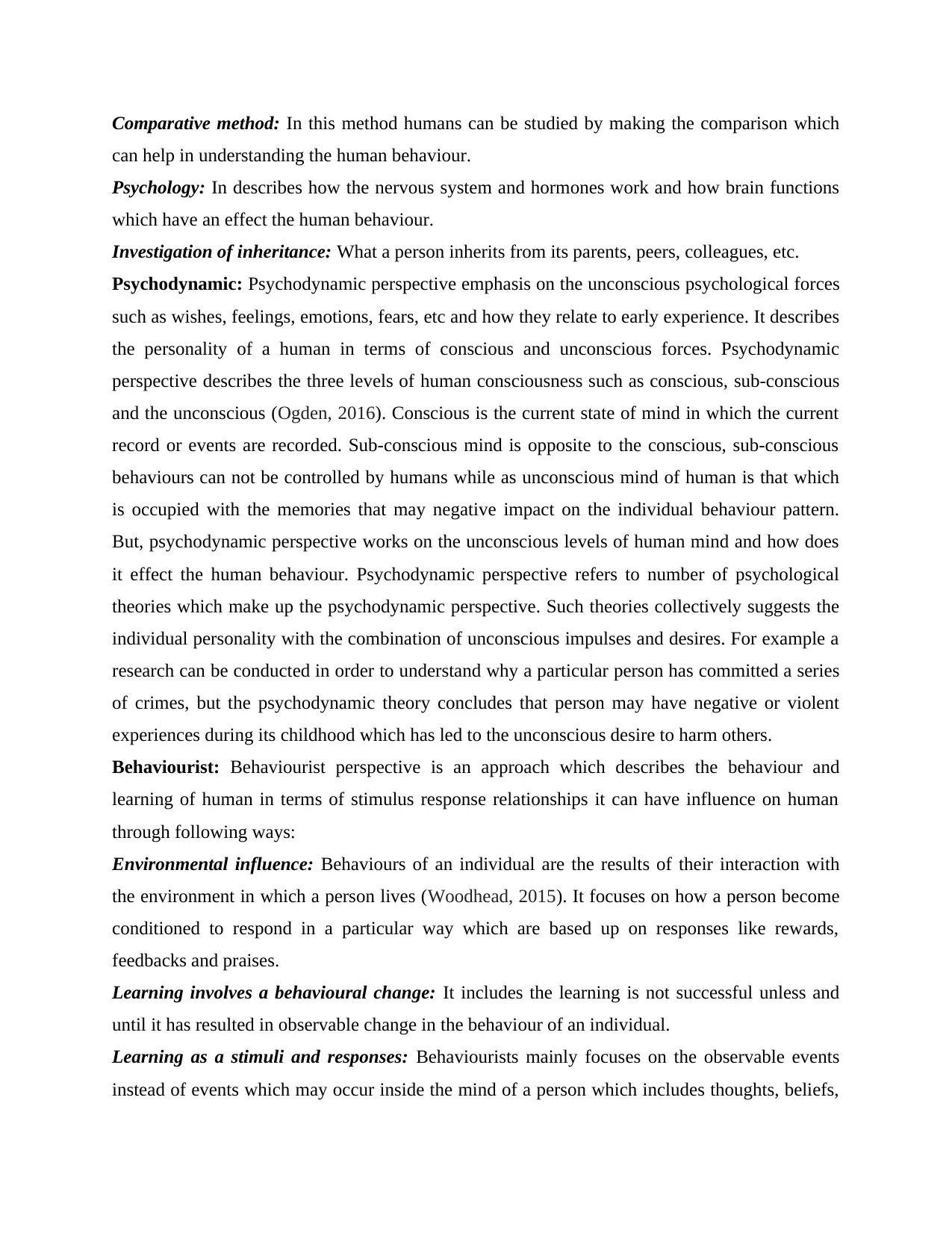
Comparative method: In this method humans can be studied by making the comparison which
can help in understanding the human behaviour.
Psychology: In describes how the nervous system and hormones work and how brain functions
which have an effect the human behaviour.
Investigation of inheritance: What a person inherits from its parents, peers, colleagues, etc.
Psychodynamic: Psychodynamic perspective emphasis on the unconscious psychological forces
such as wishes, feelings, emotions, fears, etc and how they relate to early experience. It describes
the personality of a human in terms of conscious and unconscious forces. Psychodynamic
perspective describes the three levels of human consciousness such as conscious, sub-conscious
and the unconscious (Ogden, 2016). Conscious is the current state of mind in which the current
record or events are recorded. Sub-conscious mind is opposite to the conscious, sub-conscious
behaviours can not be controlled by humans while as unconscious mind of human is that which
is occupied with the memories that may negative impact on the individual behaviour pattern.
But, psychodynamic perspective works on the unconscious levels of human mind and how does
it effect the human behaviour. Psychodynamic perspective refers to number of psychological
theories which make up the psychodynamic perspective. Such theories collectively suggests the
individual personality with the combination of unconscious impulses and desires. For example a
research can be conducted in order to understand why a particular person has committed a series
of crimes, but the psychodynamic theory concludes that person may have negative or violent
experiences during its childhood which has led to the unconscious desire to harm others.
Behaviourist: Behaviourist perspective is an approach which describes the behaviour and
learning of human in terms of stimulus response relationships it can have influence on human
through following ways:
Environmental influence: Behaviours of an individual are the results of their interaction with
the environment in which a person lives (Woodhead, 2015). It focuses on how a person become
conditioned to respond in a particular way which are based up on responses like rewards,
feedbacks and praises.
Learning involves a behavioural change: It includes the learning is not successful unless and
until it has resulted in observable change in the behaviour of an individual.
Learning as a stimuli and responses: Behaviourists mainly focuses on the observable events
instead of events which may occur inside the mind of a person which includes thoughts, beliefs,
can help in understanding the human behaviour.
Psychology: In describes how the nervous system and hormones work and how brain functions
which have an effect the human behaviour.
Investigation of inheritance: What a person inherits from its parents, peers, colleagues, etc.
Psychodynamic: Psychodynamic perspective emphasis on the unconscious psychological forces
such as wishes, feelings, emotions, fears, etc and how they relate to early experience. It describes
the personality of a human in terms of conscious and unconscious forces. Psychodynamic
perspective describes the three levels of human consciousness such as conscious, sub-conscious
and the unconscious (Ogden, 2016). Conscious is the current state of mind in which the current
record or events are recorded. Sub-conscious mind is opposite to the conscious, sub-conscious
behaviours can not be controlled by humans while as unconscious mind of human is that which
is occupied with the memories that may negative impact on the individual behaviour pattern.
But, psychodynamic perspective works on the unconscious levels of human mind and how does
it effect the human behaviour. Psychodynamic perspective refers to number of psychological
theories which make up the psychodynamic perspective. Such theories collectively suggests the
individual personality with the combination of unconscious impulses and desires. For example a
research can be conducted in order to understand why a particular person has committed a series
of crimes, but the psychodynamic theory concludes that person may have negative or violent
experiences during its childhood which has led to the unconscious desire to harm others.
Behaviourist: Behaviourist perspective is an approach which describes the behaviour and
learning of human in terms of stimulus response relationships it can have influence on human
through following ways:
Environmental influence: Behaviours of an individual are the results of their interaction with
the environment in which a person lives (Woodhead, 2015). It focuses on how a person become
conditioned to respond in a particular way which are based up on responses like rewards,
feedbacks and praises.
Learning involves a behavioural change: It includes the learning is not successful unless and
until it has resulted in observable change in the behaviour of an individual.
Learning as a stimuli and responses: Behaviourists mainly focuses on the observable events
instead of events which may occur inside the mind of a person which includes thoughts, beliefs,
Paraphrase This Document
Need a fresh take? Get an instant paraphrase of this document with our AI Paraphraser
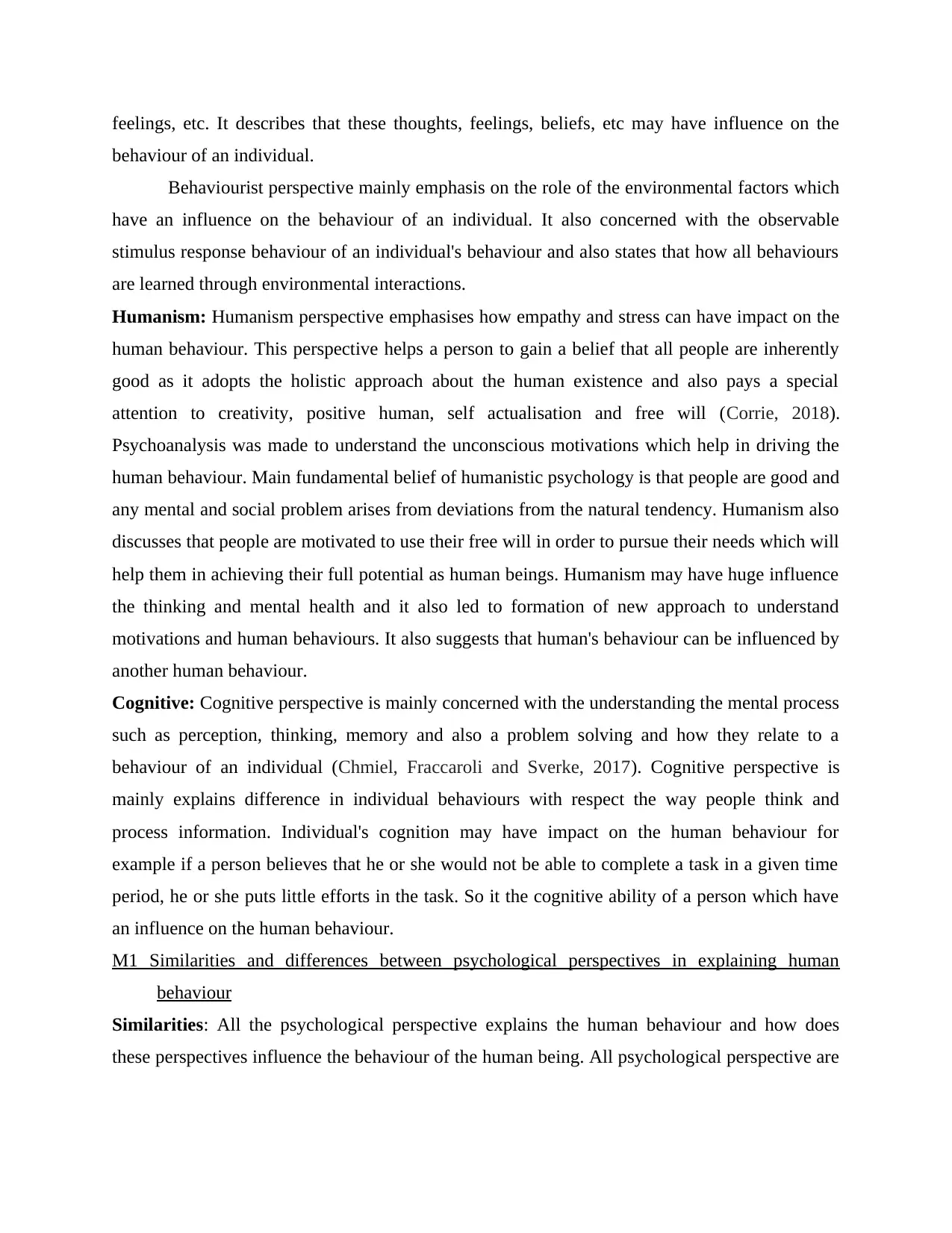
feelings, etc. It describes that these thoughts, feelings, beliefs, etc may have influence on the
behaviour of an individual.
Behaviourist perspective mainly emphasis on the role of the environmental factors which
have an influence on the behaviour of an individual. It also concerned with the observable
stimulus response behaviour of an individual's behaviour and also states that how all behaviours
are learned through environmental interactions.
Humanism: Humanism perspective emphasises how empathy and stress can have impact on the
human behaviour. This perspective helps a person to gain a belief that all people are inherently
good as it adopts the holistic approach about the human existence and also pays a special
attention to creativity, positive human, self actualisation and free will (Corrie, 2018).
Psychoanalysis was made to understand the unconscious motivations which help in driving the
human behaviour. Main fundamental belief of humanistic psychology is that people are good and
any mental and social problem arises from deviations from the natural tendency. Humanism also
discusses that people are motivated to use their free will in order to pursue their needs which will
help them in achieving their full potential as human beings. Humanism may have huge influence
the thinking and mental health and it also led to formation of new approach to understand
motivations and human behaviours. It also suggests that human's behaviour can be influenced by
another human behaviour.
Cognitive: Cognitive perspective is mainly concerned with the understanding the mental process
such as perception, thinking, memory and also a problem solving and how they relate to a
behaviour of an individual (Chmiel, Fraccaroli and Sverke, 2017). Cognitive perspective is
mainly explains difference in individual behaviours with respect the way people think and
process information. Individual's cognition may have impact on the human behaviour for
example if a person believes that he or she would not be able to complete a task in a given time
period, he or she puts little efforts in the task. So it the cognitive ability of a person which have
an influence on the human behaviour.
M1 Similarities and differences between psychological perspectives in explaining human
behaviour
Similarities: All the psychological perspective explains the human behaviour and how does
these perspectives influence the behaviour of the human being. All psychological perspective are
behaviour of an individual.
Behaviourist perspective mainly emphasis on the role of the environmental factors which
have an influence on the behaviour of an individual. It also concerned with the observable
stimulus response behaviour of an individual's behaviour and also states that how all behaviours
are learned through environmental interactions.
Humanism: Humanism perspective emphasises how empathy and stress can have impact on the
human behaviour. This perspective helps a person to gain a belief that all people are inherently
good as it adopts the holistic approach about the human existence and also pays a special
attention to creativity, positive human, self actualisation and free will (Corrie, 2018).
Psychoanalysis was made to understand the unconscious motivations which help in driving the
human behaviour. Main fundamental belief of humanistic psychology is that people are good and
any mental and social problem arises from deviations from the natural tendency. Humanism also
discusses that people are motivated to use their free will in order to pursue their needs which will
help them in achieving their full potential as human beings. Humanism may have huge influence
the thinking and mental health and it also led to formation of new approach to understand
motivations and human behaviours. It also suggests that human's behaviour can be influenced by
another human behaviour.
Cognitive: Cognitive perspective is mainly concerned with the understanding the mental process
such as perception, thinking, memory and also a problem solving and how they relate to a
behaviour of an individual (Chmiel, Fraccaroli and Sverke, 2017). Cognitive perspective is
mainly explains difference in individual behaviours with respect the way people think and
process information. Individual's cognition may have impact on the human behaviour for
example if a person believes that he or she would not be able to complete a task in a given time
period, he or she puts little efforts in the task. So it the cognitive ability of a person which have
an influence on the human behaviour.
M1 Similarities and differences between psychological perspectives in explaining human
behaviour
Similarities: All the psychological perspective explains the human behaviour and how does
these perspectives influence the behaviour of the human being. All psychological perspective are
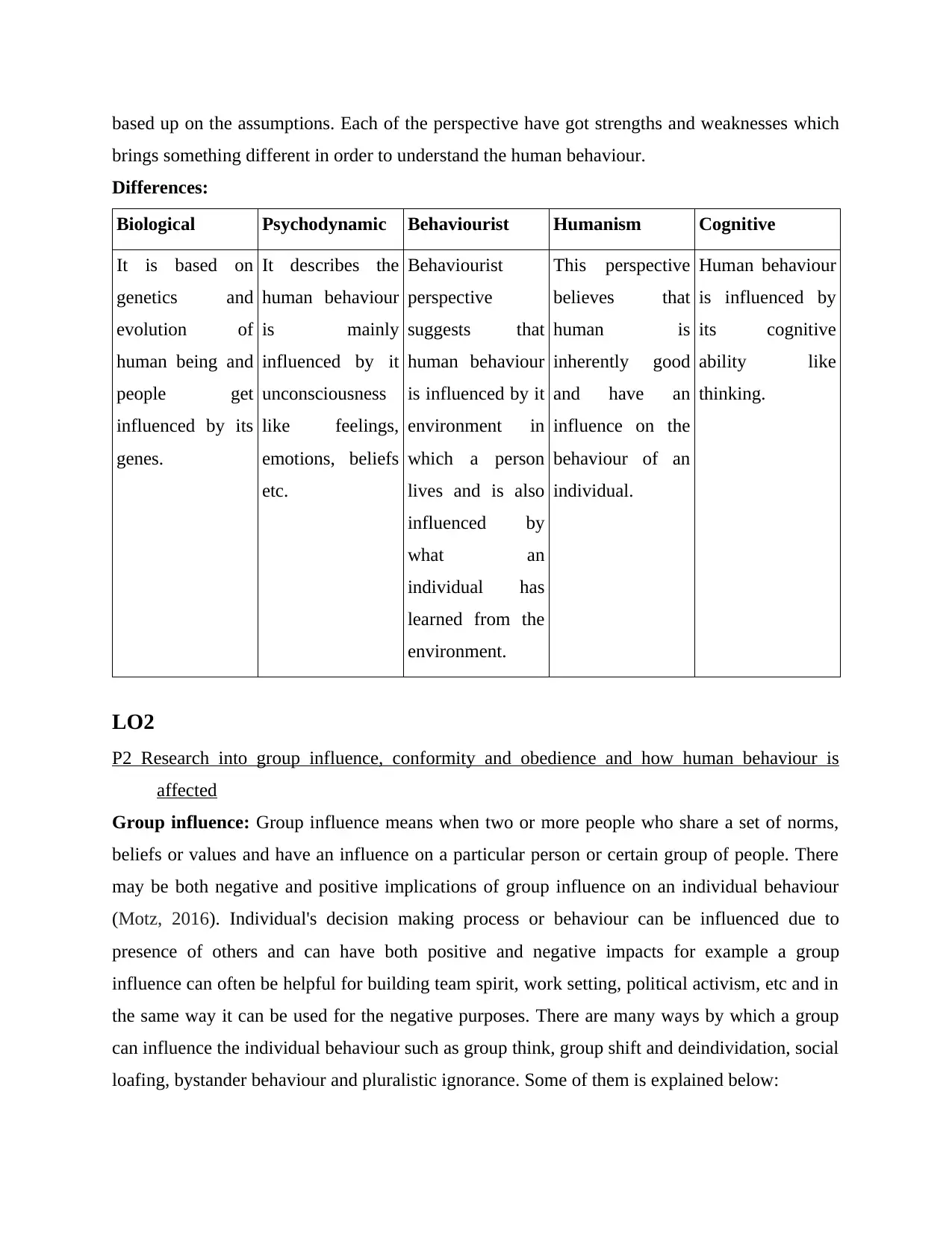
based up on the assumptions. Each of the perspective have got strengths and weaknesses which
brings something different in order to understand the human behaviour.
Differences:
Biological Psychodynamic Behaviourist Humanism Cognitive
It is based on
genetics and
evolution of
human being and
people get
influenced by its
genes.
It describes the
human behaviour
is mainly
influenced by it
unconsciousness
like feelings,
emotions, beliefs
etc.
Behaviourist
perspective
suggests that
human behaviour
is influenced by it
environment in
which a person
lives and is also
influenced by
what an
individual has
learned from the
environment.
This perspective
believes that
human is
inherently good
and have an
influence on the
behaviour of an
individual.
Human behaviour
is influenced by
its cognitive
ability like
thinking.
LO2
P2 Research into group influence, conformity and obedience and how human behaviour is
affected
Group influence: Group influence means when two or more people who share a set of norms,
beliefs or values and have an influence on a particular person or certain group of people. There
may be both negative and positive implications of group influence on an individual behaviour
(Motz, 2016). Individual's decision making process or behaviour can be influenced due to
presence of others and can have both positive and negative impacts for example a group
influence can often be helpful for building team spirit, work setting, political activism, etc and in
the same way it can be used for the negative purposes. There are many ways by which a group
can influence the individual behaviour such as group think, group shift and deindividation, social
loafing, bystander behaviour and pluralistic ignorance. Some of them is explained below:
brings something different in order to understand the human behaviour.
Differences:
Biological Psychodynamic Behaviourist Humanism Cognitive
It is based on
genetics and
evolution of
human being and
people get
influenced by its
genes.
It describes the
human behaviour
is mainly
influenced by it
unconsciousness
like feelings,
emotions, beliefs
etc.
Behaviourist
perspective
suggests that
human behaviour
is influenced by it
environment in
which a person
lives and is also
influenced by
what an
individual has
learned from the
environment.
This perspective
believes that
human is
inherently good
and have an
influence on the
behaviour of an
individual.
Human behaviour
is influenced by
its cognitive
ability like
thinking.
LO2
P2 Research into group influence, conformity and obedience and how human behaviour is
affected
Group influence: Group influence means when two or more people who share a set of norms,
beliefs or values and have an influence on a particular person or certain group of people. There
may be both negative and positive implications of group influence on an individual behaviour
(Motz, 2016). Individual's decision making process or behaviour can be influenced due to
presence of others and can have both positive and negative impacts for example a group
influence can often be helpful for building team spirit, work setting, political activism, etc and in
the same way it can be used for the negative purposes. There are many ways by which a group
can influence the individual behaviour such as group think, group shift and deindividation, social
loafing, bystander behaviour and pluralistic ignorance. Some of them is explained below:
⊘ This is a preview!⊘
Do you want full access?
Subscribe today to unlock all pages.

Trusted by 1+ million students worldwide
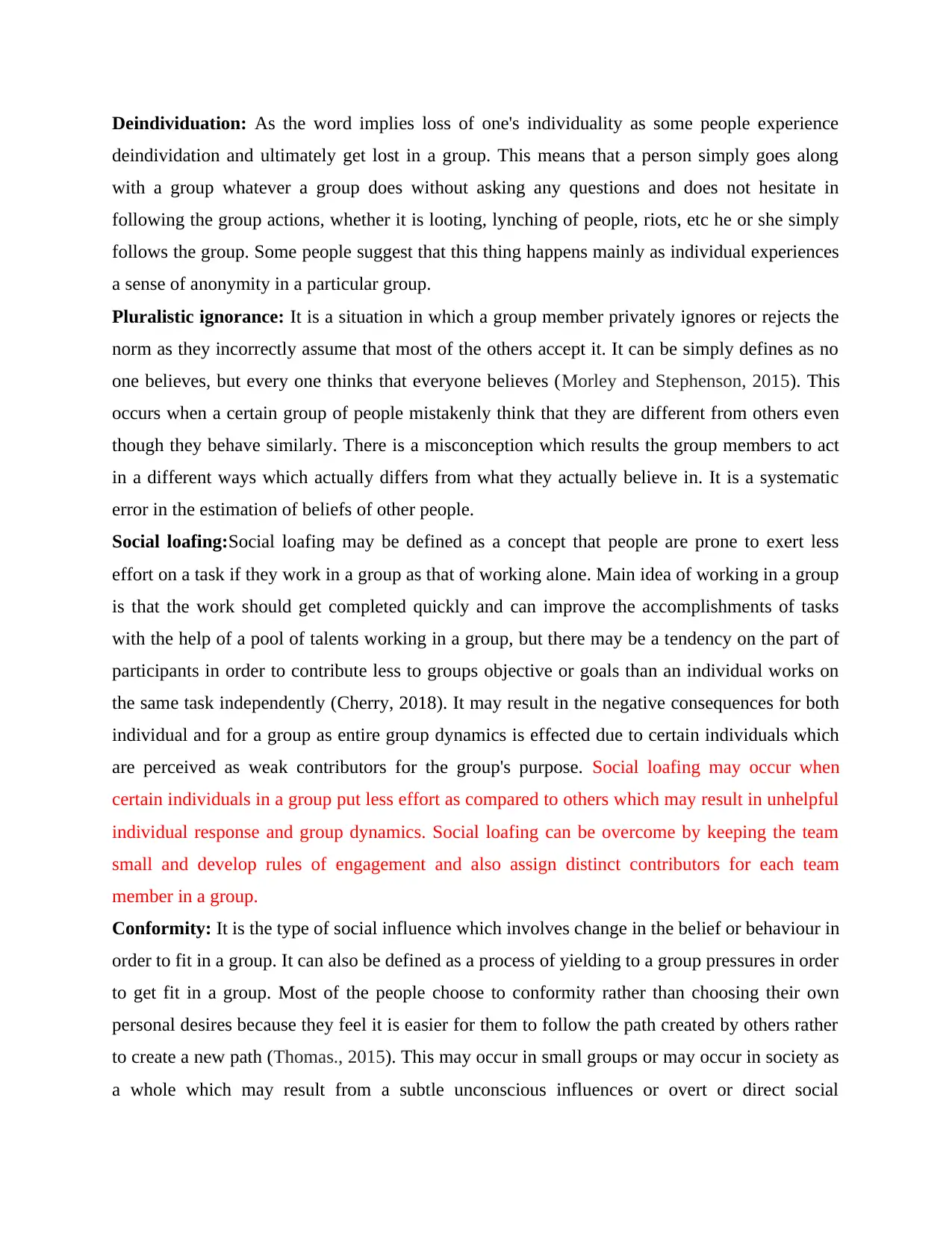
Deindividuation: As the word implies loss of one's individuality as some people experience
deindividation and ultimately get lost in a group. This means that a person simply goes along
with a group whatever a group does without asking any questions and does not hesitate in
following the group actions, whether it is looting, lynching of people, riots, etc he or she simply
follows the group. Some people suggest that this thing happens mainly as individual experiences
a sense of anonymity in a particular group.
Pluralistic ignorance: It is a situation in which a group member privately ignores or rejects the
norm as they incorrectly assume that most of the others accept it. It can be simply defines as no
one believes, but every one thinks that everyone believes (Morley and Stephenson, 2015). This
occurs when a certain group of people mistakenly think that they are different from others even
though they behave similarly. There is a misconception which results the group members to act
in a different ways which actually differs from what they actually believe in. It is a systematic
error in the estimation of beliefs of other people.
Social loafing:Social loafing may be defined as a concept that people are prone to exert less
effort on a task if they work in a group as that of working alone. Main idea of working in a group
is that the work should get completed quickly and can improve the accomplishments of tasks
with the help of a pool of talents working in a group, but there may be a tendency on the part of
participants in order to contribute less to groups objective or goals than an individual works on
the same task independently (Cherry, 2018). It may result in the negative consequences for both
individual and for a group as entire group dynamics is effected due to certain individuals which
are perceived as weak contributors for the group's purpose. Social loafing may occur when
certain individuals in a group put less effort as compared to others which may result in unhelpful
individual response and group dynamics. Social loafing can be overcome by keeping the team
small and develop rules of engagement and also assign distinct contributors for each team
member in a group.
Conformity: It is the type of social influence which involves change in the belief or behaviour in
order to fit in a group. It can also be defined as a process of yielding to a group pressures in order
to get fit in a group. Most of the people choose to conformity rather than choosing their own
personal desires because they feel it is easier for them to follow the path created by others rather
to create a new path (Thomas., 2015). This may occur in small groups or may occur in society as
a whole which may result from a subtle unconscious influences or overt or direct social
deindividation and ultimately get lost in a group. This means that a person simply goes along
with a group whatever a group does without asking any questions and does not hesitate in
following the group actions, whether it is looting, lynching of people, riots, etc he or she simply
follows the group. Some people suggest that this thing happens mainly as individual experiences
a sense of anonymity in a particular group.
Pluralistic ignorance: It is a situation in which a group member privately ignores or rejects the
norm as they incorrectly assume that most of the others accept it. It can be simply defines as no
one believes, but every one thinks that everyone believes (Morley and Stephenson, 2015). This
occurs when a certain group of people mistakenly think that they are different from others even
though they behave similarly. There is a misconception which results the group members to act
in a different ways which actually differs from what they actually believe in. It is a systematic
error in the estimation of beliefs of other people.
Social loafing:Social loafing may be defined as a concept that people are prone to exert less
effort on a task if they work in a group as that of working alone. Main idea of working in a group
is that the work should get completed quickly and can improve the accomplishments of tasks
with the help of a pool of talents working in a group, but there may be a tendency on the part of
participants in order to contribute less to groups objective or goals than an individual works on
the same task independently (Cherry, 2018). It may result in the negative consequences for both
individual and for a group as entire group dynamics is effected due to certain individuals which
are perceived as weak contributors for the group's purpose. Social loafing may occur when
certain individuals in a group put less effort as compared to others which may result in unhelpful
individual response and group dynamics. Social loafing can be overcome by keeping the team
small and develop rules of engagement and also assign distinct contributors for each team
member in a group.
Conformity: It is the type of social influence which involves change in the belief or behaviour in
order to fit in a group. It can also be defined as a process of yielding to a group pressures in order
to get fit in a group. Most of the people choose to conformity rather than choosing their own
personal desires because they feel it is easier for them to follow the path created by others rather
to create a new path (Thomas., 2015). This may occur in small groups or may occur in society as
a whole which may result from a subtle unconscious influences or overt or direct social
Paraphrase This Document
Need a fresh take? Get an instant paraphrase of this document with our AI Paraphraser
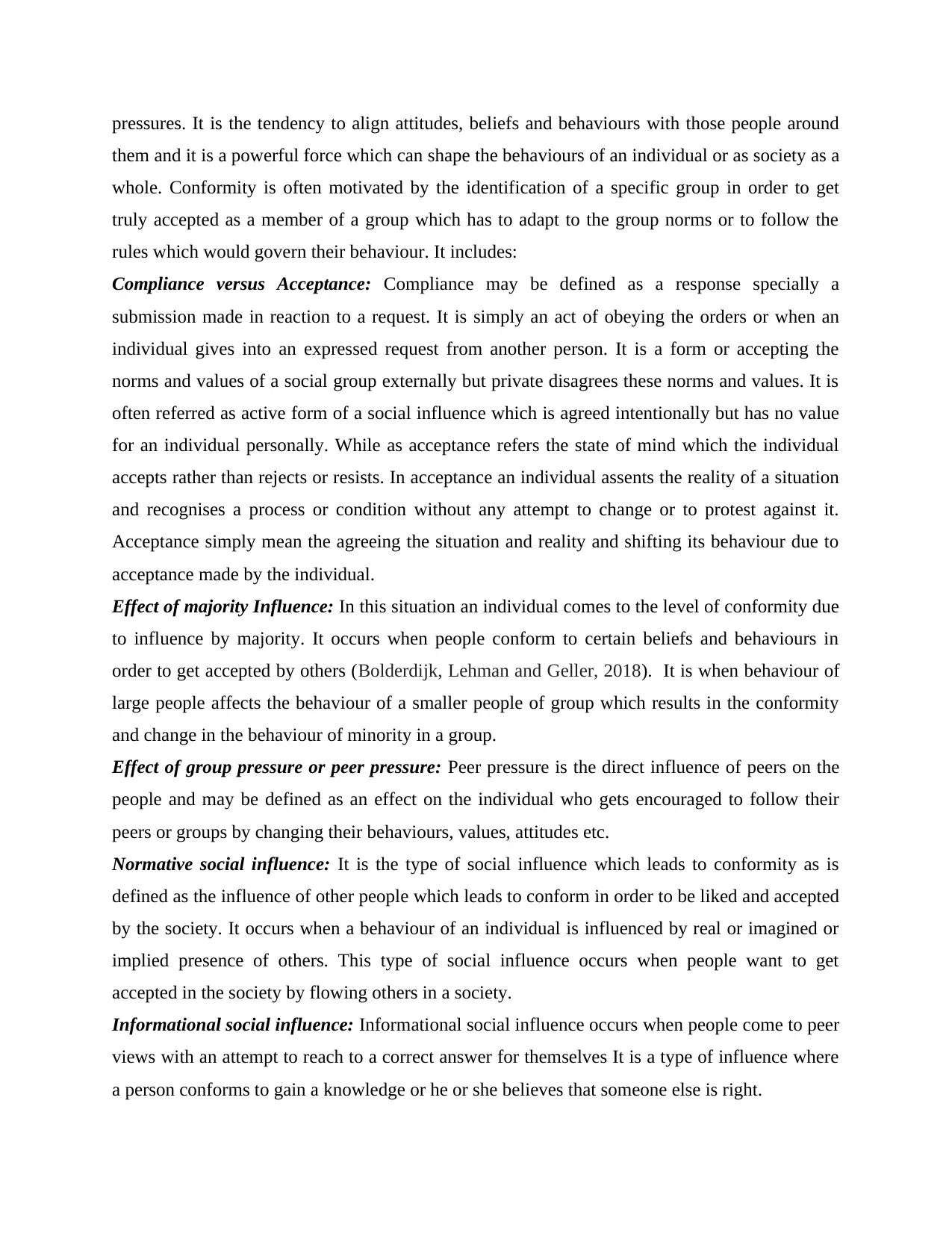
pressures. It is the tendency to align attitudes, beliefs and behaviours with those people around
them and it is a powerful force which can shape the behaviours of an individual or as society as a
whole. Conformity is often motivated by the identification of a specific group in order to get
truly accepted as a member of a group which has to adapt to the group norms or to follow the
rules which would govern their behaviour. It includes:
Compliance versus Acceptance: Compliance may be defined as a response specially a
submission made in reaction to a request. It is simply an act of obeying the orders or when an
individual gives into an expressed request from another person. It is a form or accepting the
norms and values of a social group externally but private disagrees these norms and values. It is
often referred as active form of a social influence which is agreed intentionally but has no value
for an individual personally. While as acceptance refers the state of mind which the individual
accepts rather than rejects or resists. In acceptance an individual assents the reality of a situation
and recognises a process or condition without any attempt to change or to protest against it.
Acceptance simply mean the agreeing the situation and reality and shifting its behaviour due to
acceptance made by the individual.
Effect of majority Influence: In this situation an individual comes to the level of conformity due
to influence by majority. It occurs when people conform to certain beliefs and behaviours in
order to get accepted by others (Bolderdijk, Lehman and Geller, 2018). It is when behaviour of
large people affects the behaviour of a smaller people of group which results in the conformity
and change in the behaviour of minority in a group.
Effect of group pressure or peer pressure: Peer pressure is the direct influence of peers on the
people and may be defined as an effect on the individual who gets encouraged to follow their
peers or groups by changing their behaviours, values, attitudes etc.
Normative social influence: It is the type of social influence which leads to conformity as is
defined as the influence of other people which leads to conform in order to be liked and accepted
by the society. It occurs when a behaviour of an individual is influenced by real or imagined or
implied presence of others. This type of social influence occurs when people want to get
accepted in the society by flowing others in a society.
Informational social influence: Informational social influence occurs when people come to peer
views with an attempt to reach to a correct answer for themselves It is a type of influence where
a person conforms to gain a knowledge or he or she believes that someone else is right.
them and it is a powerful force which can shape the behaviours of an individual or as society as a
whole. Conformity is often motivated by the identification of a specific group in order to get
truly accepted as a member of a group which has to adapt to the group norms or to follow the
rules which would govern their behaviour. It includes:
Compliance versus Acceptance: Compliance may be defined as a response specially a
submission made in reaction to a request. It is simply an act of obeying the orders or when an
individual gives into an expressed request from another person. It is a form or accepting the
norms and values of a social group externally but private disagrees these norms and values. It is
often referred as active form of a social influence which is agreed intentionally but has no value
for an individual personally. While as acceptance refers the state of mind which the individual
accepts rather than rejects or resists. In acceptance an individual assents the reality of a situation
and recognises a process or condition without any attempt to change or to protest against it.
Acceptance simply mean the agreeing the situation and reality and shifting its behaviour due to
acceptance made by the individual.
Effect of majority Influence: In this situation an individual comes to the level of conformity due
to influence by majority. It occurs when people conform to certain beliefs and behaviours in
order to get accepted by others (Bolderdijk, Lehman and Geller, 2018). It is when behaviour of
large people affects the behaviour of a smaller people of group which results in the conformity
and change in the behaviour of minority in a group.
Effect of group pressure or peer pressure: Peer pressure is the direct influence of peers on the
people and may be defined as an effect on the individual who gets encouraged to follow their
peers or groups by changing their behaviours, values, attitudes etc.
Normative social influence: It is the type of social influence which leads to conformity as is
defined as the influence of other people which leads to conform in order to be liked and accepted
by the society. It occurs when a behaviour of an individual is influenced by real or imagined or
implied presence of others. This type of social influence occurs when people want to get
accepted in the society by flowing others in a society.
Informational social influence: Informational social influence occurs when people come to peer
views with an attempt to reach to a correct answer for themselves It is a type of influence where
a person conforms to gain a knowledge or he or she believes that someone else is right.
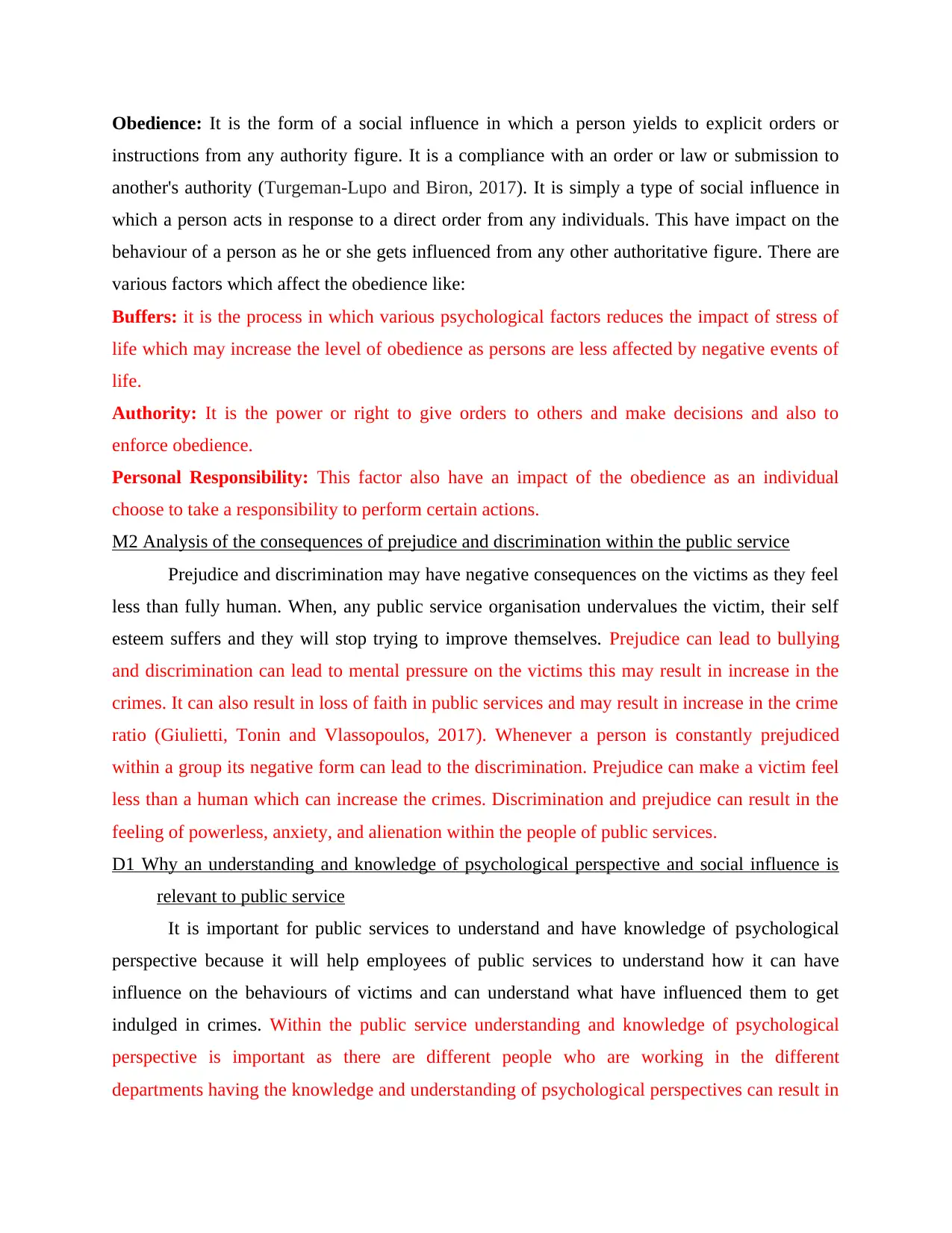
Obedience: It is the form of a social influence in which a person yields to explicit orders or
instructions from any authority figure. It is a compliance with an order or law or submission to
another's authority (Turgeman-Lupo and Biron, 2017). It is simply a type of social influence in
which a person acts in response to a direct order from any individuals. This have impact on the
behaviour of a person as he or she gets influenced from any other authoritative figure. There are
various factors which affect the obedience like:
Buffers: it is the process in which various psychological factors reduces the impact of stress of
life which may increase the level of obedience as persons are less affected by negative events of
life.
Authority: It is the power or right to give orders to others and make decisions and also to
enforce obedience.
Personal Responsibility: This factor also have an impact of the obedience as an individual
choose to take a responsibility to perform certain actions.
M2 Analysis of the consequences of prejudice and discrimination within the public service
Prejudice and discrimination may have negative consequences on the victims as they feel
less than fully human. When, any public service organisation undervalues the victim, their self
esteem suffers and they will stop trying to improve themselves. Prejudice can lead to bullying
and discrimination can lead to mental pressure on the victims this may result in increase in the
crimes. It can also result in loss of faith in public services and may result in increase in the crime
ratio (Giulietti, Tonin and Vlassopoulos, 2017). Whenever a person is constantly prejudiced
within a group its negative form can lead to the discrimination. Prejudice can make a victim feel
less than a human which can increase the crimes. Discrimination and prejudice can result in the
feeling of powerless, anxiety, and alienation within the people of public services.
D1 Why an understanding and knowledge of psychological perspective and social influence is
relevant to public service
It is important for public services to understand and have knowledge of psychological
perspective because it will help employees of public services to understand how it can have
influence on the behaviours of victims and can understand what have influenced them to get
indulged in crimes. Within the public service understanding and knowledge of psychological
perspective is important as there are different people who are working in the different
departments having the knowledge and understanding of psychological perspectives can result in
instructions from any authority figure. It is a compliance with an order or law or submission to
another's authority (Turgeman-Lupo and Biron, 2017). It is simply a type of social influence in
which a person acts in response to a direct order from any individuals. This have impact on the
behaviour of a person as he or she gets influenced from any other authoritative figure. There are
various factors which affect the obedience like:
Buffers: it is the process in which various psychological factors reduces the impact of stress of
life which may increase the level of obedience as persons are less affected by negative events of
life.
Authority: It is the power or right to give orders to others and make decisions and also to
enforce obedience.
Personal Responsibility: This factor also have an impact of the obedience as an individual
choose to take a responsibility to perform certain actions.
M2 Analysis of the consequences of prejudice and discrimination within the public service
Prejudice and discrimination may have negative consequences on the victims as they feel
less than fully human. When, any public service organisation undervalues the victim, their self
esteem suffers and they will stop trying to improve themselves. Prejudice can lead to bullying
and discrimination can lead to mental pressure on the victims this may result in increase in the
crimes. It can also result in loss of faith in public services and may result in increase in the crime
ratio (Giulietti, Tonin and Vlassopoulos, 2017). Whenever a person is constantly prejudiced
within a group its negative form can lead to the discrimination. Prejudice can make a victim feel
less than a human which can increase the crimes. Discrimination and prejudice can result in the
feeling of powerless, anxiety, and alienation within the people of public services.
D1 Why an understanding and knowledge of psychological perspective and social influence is
relevant to public service
It is important for public services to understand and have knowledge of psychological
perspective because it will help employees of public services to understand how it can have
influence on the behaviours of victims and can understand what have influenced them to get
indulged in crimes. Within the public service understanding and knowledge of psychological
perspective is important as there are different people who are working in the different
departments having the knowledge and understanding of psychological perspectives can result in
⊘ This is a preview!⊘
Do you want full access?
Subscribe today to unlock all pages.

Trusted by 1+ million students worldwide
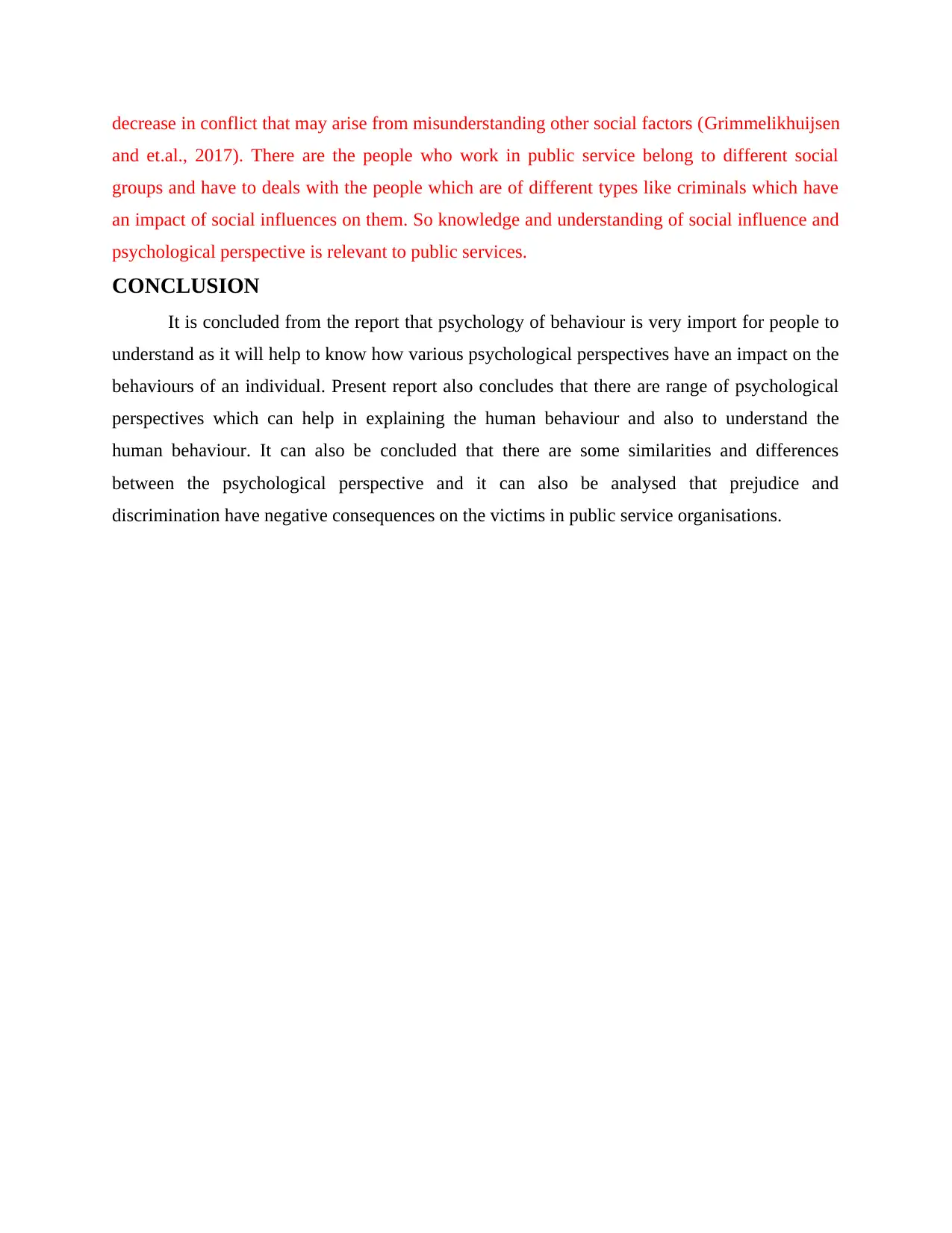
decrease in conflict that may arise from misunderstanding other social factors (Grimmelikhuijsen
and et.al., 2017). There are the people who work in public service belong to different social
groups and have to deals with the people which are of different types like criminals which have
an impact of social influences on them. So knowledge and understanding of social influence and
psychological perspective is relevant to public services.
CONCLUSION
It is concluded from the report that psychology of behaviour is very import for people to
understand as it will help to know how various psychological perspectives have an impact on the
behaviours of an individual. Present report also concludes that there are range of psychological
perspectives which can help in explaining the human behaviour and also to understand the
human behaviour. It can also be concluded that there are some similarities and differences
between the psychological perspective and it can also be analysed that prejudice and
discrimination have negative consequences on the victims in public service organisations.
and et.al., 2017). There are the people who work in public service belong to different social
groups and have to deals with the people which are of different types like criminals which have
an impact of social influences on them. So knowledge and understanding of social influence and
psychological perspective is relevant to public services.
CONCLUSION
It is concluded from the report that psychology of behaviour is very import for people to
understand as it will help to know how various psychological perspectives have an impact on the
behaviours of an individual. Present report also concludes that there are range of psychological
perspectives which can help in explaining the human behaviour and also to understand the
human behaviour. It can also be concluded that there are some similarities and differences
between the psychological perspective and it can also be analysed that prejudice and
discrimination have negative consequences on the victims in public service organisations.
Paraphrase This Document
Need a fresh take? Get an instant paraphrase of this document with our AI Paraphraser
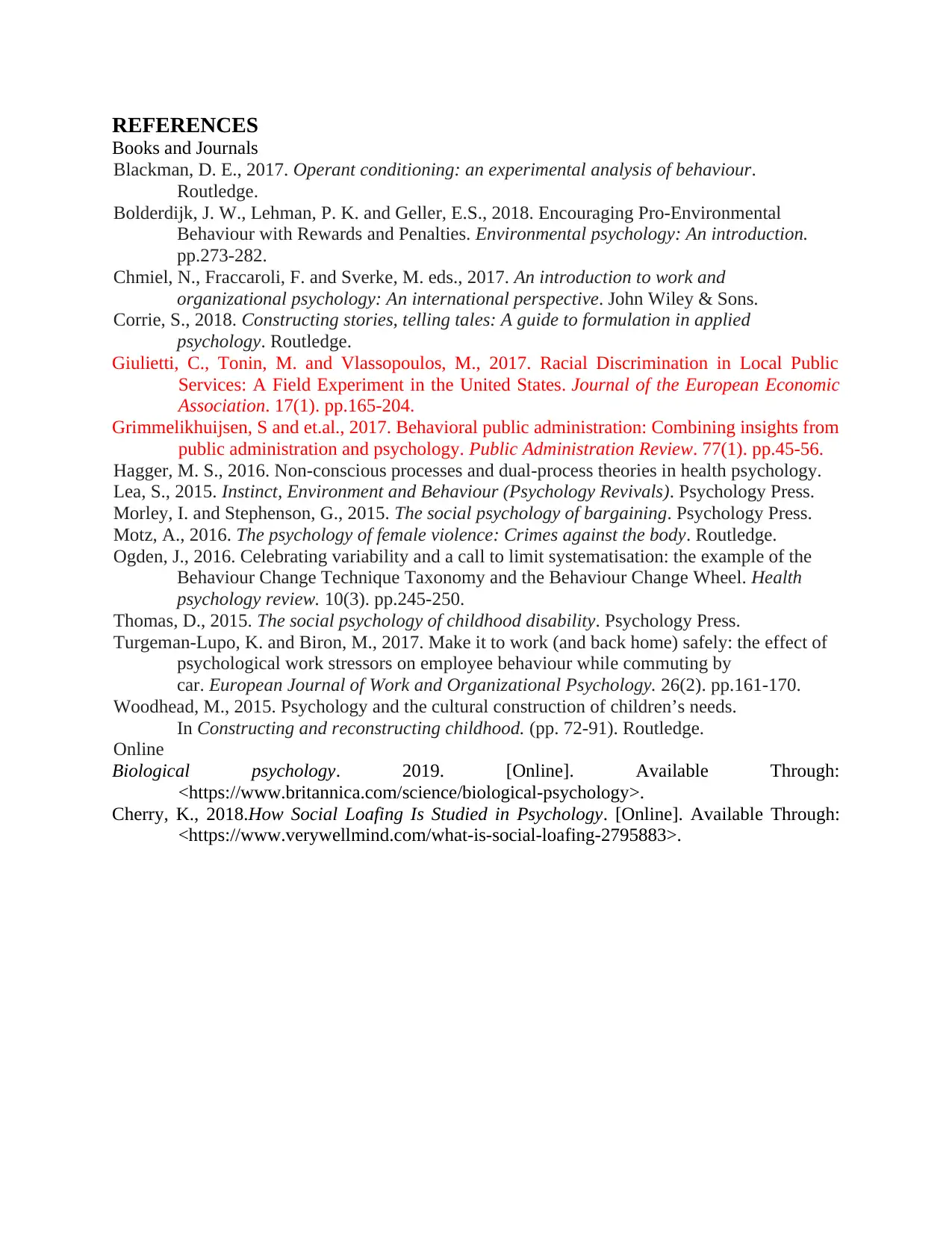
REFERENCES
Books and Journals
Blackman, D. E., 2017. Operant conditioning: an experimental analysis of behaviour.
Routledge.
Bolderdijk, J. W., Lehman, P. K. and Geller, E.S., 2018. Encouraging Pro‐Environmental
Behaviour with Rewards and Penalties. Environmental psychology: An introduction.
pp.273-282.
Chmiel, N., Fraccaroli, F. and Sverke, M. eds., 2017. An introduction to work and
organizational psychology: An international perspective. John Wiley & Sons.
Corrie, S., 2018. Constructing stories, telling tales: A guide to formulation in applied
psychology. Routledge.
Giulietti, C., Tonin, M. and Vlassopoulos, M., 2017. Racial Discrimination in Local Public
Services: A Field Experiment in the United States. Journal of the European Economic
Association. 17(1). pp.165-204.
Grimmelikhuijsen, S and et.al., 2017. Behavioral public administration: Combining insights from
public administration and psychology. Public Administration Review. 77(1). pp.45-56.
Hagger, M. S., 2016. Non-conscious processes and dual-process theories in health psychology.
Lea, S., 2015. Instinct, Environment and Behaviour (Psychology Revivals). Psychology Press.
Morley, I. and Stephenson, G., 2015. The social psychology of bargaining. Psychology Press.
Motz, A., 2016. The psychology of female violence: Crimes against the body. Routledge.
Ogden, J., 2016. Celebrating variability and a call to limit systematisation: the example of the
Behaviour Change Technique Taxonomy and the Behaviour Change Wheel. Health
psychology review. 10(3). pp.245-250.
Thomas, D., 2015. The social psychology of childhood disability. Psychology Press.
Turgeman-Lupo, K. and Biron, M., 2017. Make it to work (and back home) safely: the effect of
psychological work stressors on employee behaviour while commuting by
car. European Journal of Work and Organizational Psychology. 26(2). pp.161-170.
Woodhead, M., 2015. Psychology and the cultural construction of children’s needs.
In Constructing and reconstructing childhood. (pp. 72-91). Routledge.
Online
Biological psychology. 2019. [Online]. Available Through:
<https://www.britannica.com/science/biological-psychology>.
Cherry, K., 2018.How Social Loafing Is Studied in Psychology. [Online]. Available Through:
<https://www.verywellmind.com/what-is-social-loafing-2795883>.
Books and Journals
Blackman, D. E., 2017. Operant conditioning: an experimental analysis of behaviour.
Routledge.
Bolderdijk, J. W., Lehman, P. K. and Geller, E.S., 2018. Encouraging Pro‐Environmental
Behaviour with Rewards and Penalties. Environmental psychology: An introduction.
pp.273-282.
Chmiel, N., Fraccaroli, F. and Sverke, M. eds., 2017. An introduction to work and
organizational psychology: An international perspective. John Wiley & Sons.
Corrie, S., 2018. Constructing stories, telling tales: A guide to formulation in applied
psychology. Routledge.
Giulietti, C., Tonin, M. and Vlassopoulos, M., 2017. Racial Discrimination in Local Public
Services: A Field Experiment in the United States. Journal of the European Economic
Association. 17(1). pp.165-204.
Grimmelikhuijsen, S and et.al., 2017. Behavioral public administration: Combining insights from
public administration and psychology. Public Administration Review. 77(1). pp.45-56.
Hagger, M. S., 2016. Non-conscious processes and dual-process theories in health psychology.
Lea, S., 2015. Instinct, Environment and Behaviour (Psychology Revivals). Psychology Press.
Morley, I. and Stephenson, G., 2015. The social psychology of bargaining. Psychology Press.
Motz, A., 2016. The psychology of female violence: Crimes against the body. Routledge.
Ogden, J., 2016. Celebrating variability and a call to limit systematisation: the example of the
Behaviour Change Technique Taxonomy and the Behaviour Change Wheel. Health
psychology review. 10(3). pp.245-250.
Thomas, D., 2015. The social psychology of childhood disability. Psychology Press.
Turgeman-Lupo, K. and Biron, M., 2017. Make it to work (and back home) safely: the effect of
psychological work stressors on employee behaviour while commuting by
car. European Journal of Work and Organizational Psychology. 26(2). pp.161-170.
Woodhead, M., 2015. Psychology and the cultural construction of children’s needs.
In Constructing and reconstructing childhood. (pp. 72-91). Routledge.
Online
Biological psychology. 2019. [Online]. Available Through:
<https://www.britannica.com/science/biological-psychology>.
Cherry, K., 2018.How Social Loafing Is Studied in Psychology. [Online]. Available Through:
<https://www.verywellmind.com/what-is-social-loafing-2795883>.
1 out of 11
Related Documents
Your All-in-One AI-Powered Toolkit for Academic Success.
+13062052269
info@desklib.com
Available 24*7 on WhatsApp / Email
![[object Object]](/_next/static/media/star-bottom.7253800d.svg)
Unlock your academic potential
Copyright © 2020–2026 A2Z Services. All Rights Reserved. Developed and managed by ZUCOL.


